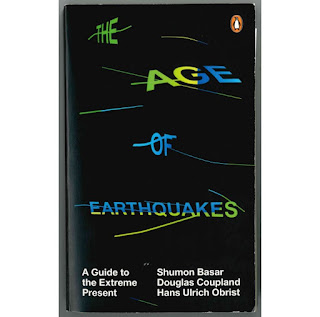Around Christmas I caught up with my friend Edwin, who I first met almost 40 years ago at primary school. As long as I've known him, Edwin has been a reader of books and we enjoy talking about the books we have read recently on the occasions when we meet up.
I didn't have many books to talk about when we met up last. My reading has dropped off a cliff since the pandemic. I felt challenged when Ed told me he had set an ambitious target of the number of books to read in 2023. I set myself a much lower target that feels a lot more attainable - a book a month.
I've started with a easy one. The Age of Earthquakes is a collaborative piece by Shumon Basar, Douglas Coupland and Hans Ulrich Obrist. Cathy bought it for me as a surprise gift because she saw this copy for sale in Oxfam's online shop and it was signed by all three authors.
Despite looking like a full size paperback, several pages are just one thought-provoking line or question. So it was very quick to read through. The questions are things like...
- Have you maybe noticed that our lives are no longer feeling like stories?
- Are generations still measured in years?
And the thought-provoking lines are things like...
- Before the Internet we had a few memes a year. Now we get hundreds a day.
- You know the future's really happening when you start feeling scared.
The book explains its title by pointing out that Internet use now accounts for ten per cent of the world's energy demands - or the same amount that was used to light the entire planet in 1985. The energy demands are pushing up global temperatures. The change in temperature is causing melting permafrost, glacial retreat and shrinking ice caps. As the weight of the ice decreases, this is releasing geologic pressure resulting in earthquakes. The mass of humanity logging into social media is literally having a seismic affect.
The recurring theme of the book is what does it mean to be human in an increasingly digital world. Hardly anyone is an analog human any more. We have digital personas and possess digital real estate. There are some common themes here from some of Douglas Coupland's other books that I've read recently, and some material that I've read before. I think it got repackaged into Machines Will Make Better Choices Than Humans or Shopping in Jail, or possibly both.
Despite mapping out a possible future where humans are surpassed by their own digital selves, Coupland et al end on a relatively hopeful yet pessimistic note that is printed on the back cover.



No comments:
Post a Comment